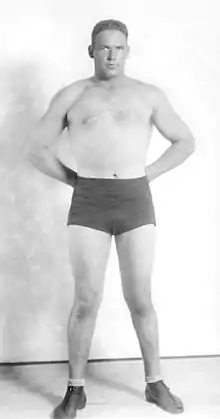Wee Willie Davis
William "Wee Willie" Davis (December 7, 1906 – April 9, 1981) was an American film actor and professional wrestler. He was born in New York City and died in Louisville, Kentucky, aged 74.

Wee Willie Davis
He worked in the Jefferson County Jail in Louisville in 1972–75 as the gym guard.
He was also an engineer and contributed to the invention of the Glowmeter, an early Heads up display that projected a car's speed onto the windshield. A fellow wrestler, "Prince Ilaki Ibn Ali Hassan" (real name Agisilaki Mihalakis), who also fought as the "Mad Greek", was the primary inventor.[1]
Filmography
- Shadow of the Thin Man (1941) – Mug (uncredited)
- Reap the Wild Wind (1942) – The Lamb
- Gentleman Jim (1942) – Flannagan (uncredited)
- Arabian Nights (1942) – Valda
- Above Suspicion (1943) – Hans – Aschenhausen's Man (uncredited)
- Thumbs Up (1943) – Basil (uncredited)
- Johnny Come Lately (1943) – Bouncer
- Ali Baba and the Forty Thieves (1944) – Arab Giant (uncredited)
- Ghost Catchers (1944) – Mug (uncredited)
- Gypsy Wildcat (1944) – Dota (uncredited)
- Having Wonderful Crime (1945) – Zacharias, the Porter
- Wildfire (1945) – Henchman Moose Harris
- Pursuit to Algiers (1945) – Gubec
- Night in Paradise (1946) – Salabaar
- Beware (1946) – Tympani Five Pianist
- Bowery Bombshell (1946) – Moose McCall
- Fool's Gold (1946) – Blackie
- Calendar Girl (1947) – Swedish Tug of War Man (uncredited)
- The Foxes of Harrow (1947) – Sailor (uncredited)
- The Red Pony (1949) – Truck Driver (uncredited)
- Mighty Joe Young (1949) – Strongman (uncredited)
- Bodyhold (1949) – Harold Hocksteader aka Azusa Assassin
- Samson and Delilah (1949) – Garmiskar
- The Asphalt Jungle (1950) – Timmons
- Abbott and Costello in the Foreign Legion (1950) – Abdullah
- Aladdin and His Lamp (1952) – Gobbo (uncredited)
- The World in His Arms (1952) – 'Shanghai' Kelley (uncredited)
- Son of Paleface (1952) – Blacksmith
- To Catch a Thief (1955) – Big Man in Kitchen (uncredited)
- American Hot Wax (1978) – Freed's Friend (final film role)
References
- Mechanix Illustrated, July 1950, p. 60
This article is issued from Wikipedia. The text is licensed under Creative Commons - Attribution - Sharealike. Additional terms may apply for the media files.
